Читать книгу Against Verres - Marcus Tullius Cicero - Страница 58
На сайте Литреса книга снята с продажи.
36
ОглавлениеTable of Contents
When Caius Malleolus, the quaestor of Dolabella, had been slain, he thought that two inheritances had come to him; one, that of his quaestorian office, for he was immediately desired by Dolabella to be his proquaestor; the other, of a guardianship, for as he was appointed guardian of the young Malleolus, he immediately invaded his property. [91] For Malleolus had started for his province so splendidly equipped that he left actually nothing behind him at home. Besides, he had put out a great deal of money among the provincials, and had taken bills from them. He had taken with him a great quantity of admirably embossed silver plate. For he, too, was a companion of that fellow Verres in that disease and in that covetousness; and so he left behind him at his death a great quantity of silver plate, a great household of slaves, many workmen, many beautiful youths. That fellow seized all the plate that took his fancy; carried off all the slaves he chose; carried off the wines and all the other things which are procured most easily in Asia, which he had left behind: the rest he sold, and took the money himself. [92] Though it was plain that he had received two million, five hundred thousand sesterces, when he returned to Rome, he rendered no account to his ward, none to his ward's mother, none to his fellow-guardians; though he had the servants of his ward, who were workmen, at home, and beautiful and accomplished slaves about him, he said that they were his own,--that he had bought them. When the mother and grandmother of the boy repeatedly asked him if he would neither restore the mosey nor render an account, at least to say how much money of Malleolus's he had received, being wearied with their importunities, at last he said, a million of sesterces. Then on the last line of his accounts, he put in a name at the bottom by a most shameless erasure; he put down that he had paid to Chrysogonus, a slave, six hundred thousand sesterces which he had received for his ward Malleolus. How out of a million they became six hundred thousand; how the six hundred thousand tallied so exactly with other accounts,--that of the money belonging to Cnaeus Carbo there was also a remainder of six hundred thousand sesterces; and how it was that they were put down as paid to Chrysogonus; why that name occurred on the bottom line of the page, and after an erasure, you will judge. [93] Yet, though he had entered in his accounts six hundred thousand sesterces as having been received, he has never paid over fifty thousand. Of the slaves, since he has been prosecuted in this manner, some have been restored, some are detained even now. All the gains which they had made, and all their substitutes[12] are detained.
